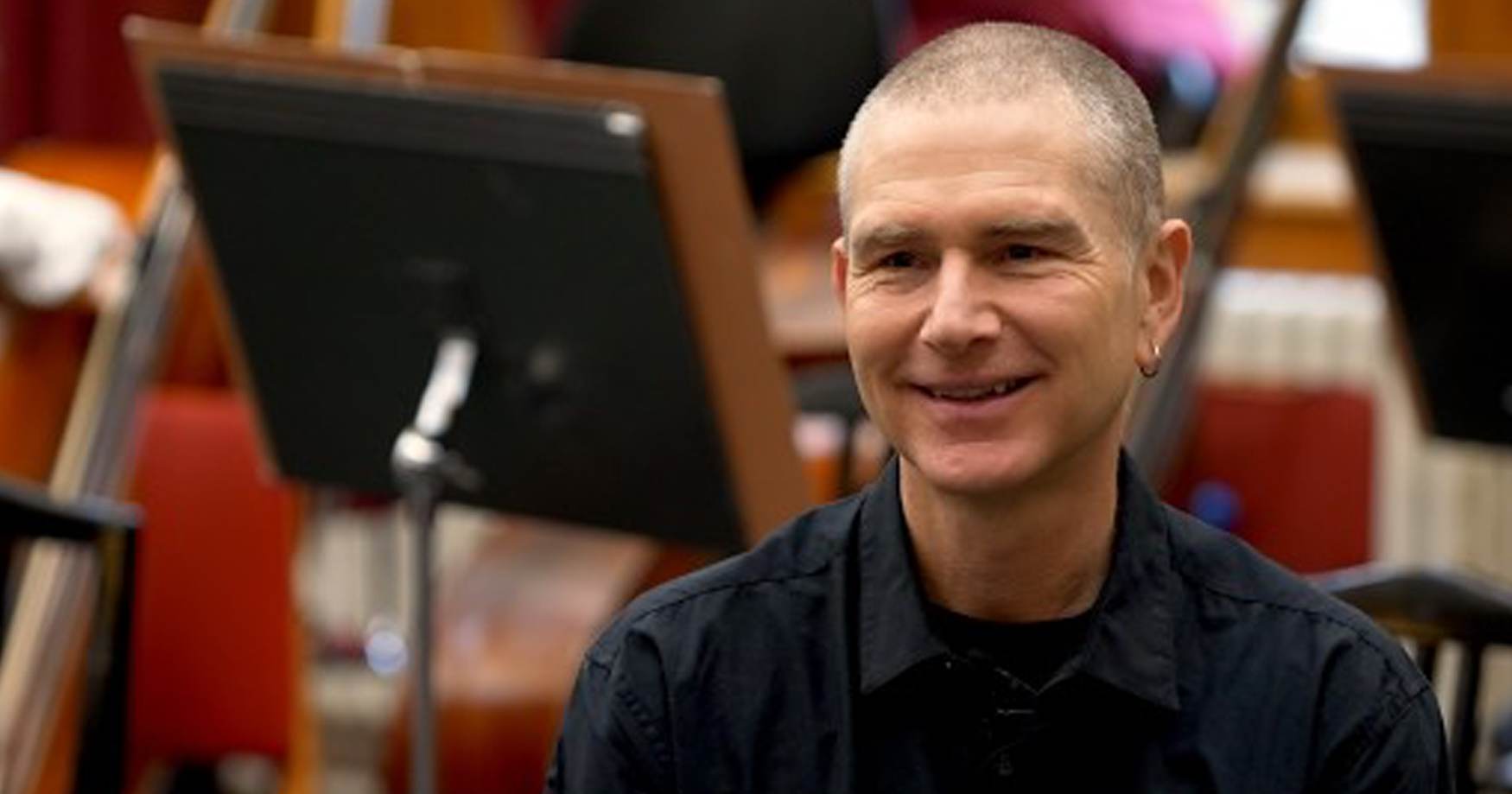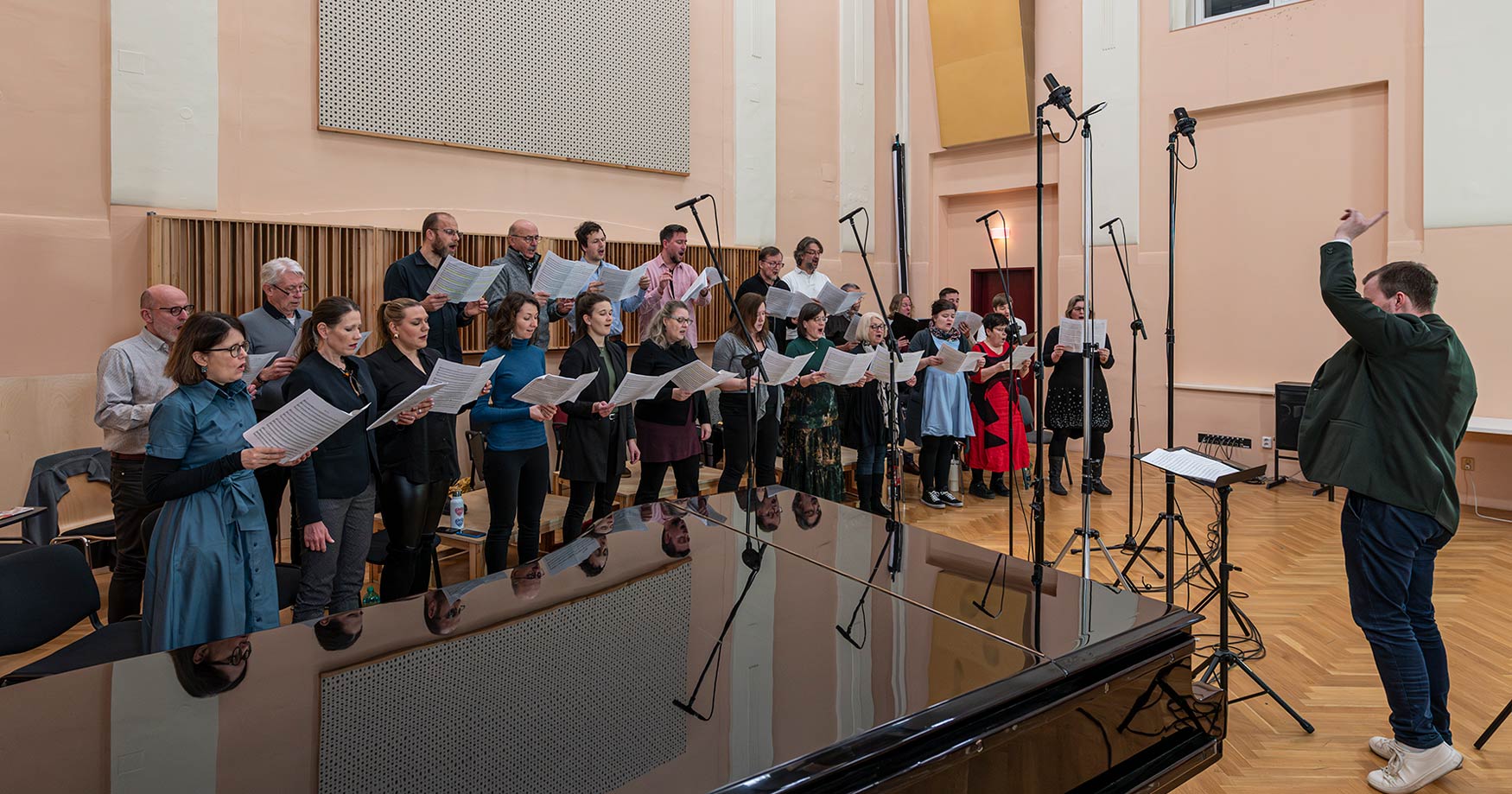Ever wondered what a session with PARMA is actually like? Guest blogger and PARMA artist Michael J. Evans is here to share his insight in this journal reflecting his experiences at his recording sessions for his upcoming album THE ADVENTURES OF FLORIAN. This album will be his his eighth release on Navona Records, telling a fantastical story as performed by the Janaček Philharmonic Orchestra in the Czech Republic.
I promise you will not come back as the same person you were before you left, and that will be a good thing.
January 5, 2020
We start recording in the Czech Republic on the 10th, but I’m preparing now; actually, I’ve been preparing for a couple of months: studying the Czech language and practicing every day, shopping for a few things, working with the PARMA team to prep for the sessions, and coordinating with friends who will meet me in Prague after the recording.
Today I’ve been all over the place emotionally. This project was written 3 years ago, and I’ve been working on it in some way or other since then. I hired a wonderful illustrator, and I am in the process of preparing to record now. I’ve felt this combination of excitement and a sort of sadness too. I’m also feeling the insecurity that I think we all experience, that feeling that leads to the inevitable question, “Is it good enough?”
Well, it’s going to be what it is, and I know the insecurity will disappear as soon as I’m in the studio with the musicians. We are all working to make something beautiful. And, I have a good feeling about this project as well. The subject is important, and I know it will connect with people.
The orchestra we are working with has an amazing reputation and I’m so honored that they are recording my work. It is a dream come true. We have a classical radio station here in DC, WETA, and this orchestra’s recordings are played a lot. I know they are phenomenal.
I think the vague sadness is not really sadness, but the feeling of space that is being created as this piece is released from my heart and into the world. It’s kind of like what parents must experience when they are prepping their kids for college. It is wonderful, necessary, and things will be different after they go. They will be grown and will face a world where they will have to stand on their own. I’m confident my child, (this work) will have a lot to offer. I’m ready for it and I’m excited too. Can’t wait!
January 8, 2020
I’m sitting in the airport waiting for my flight to Paris. This is probably the 5th time I’ve flown into that city, whether to connect to someplace else, or to stay. It is someplace I’d always dreamed of going when I was a child, but where and when I was a child, people didn’t travel like they do now.
I remember reading the fairytales and the stories where the person “set off into the world to find their fortune,” at least that is the line I remember. Fairytales are important. I know they were for my friends and me, we were the oddballs, the freaks, or whatever else we were called in the rural Midwest. I remember a particular conversation with one friend. We were discussing how our lives were so different from our early years, and he looked at me and said, “Mike, that’s because we believed the fairytales.” I’ll never forget that moment, because it was, and continues to be true.
Fairytales are important, and this piece we are recording is a fairytale. It features a transgender hero and a gay prince. Children need to see themselves in fairytales. They need to believe that the stories are real; or, at least real possibilities for a much bigger, fuller, and happier life exist for them, even if they don’t see them reflected in whatever reality they currently find themselves in. The stories give them the tools to learn how to prepare to face the challenges of life and triumph as the heroes of their own story. I hope that this piece we are about to record provides that to our LGBT+ youth.
Once I get to Paris it will be morning, and I will catch a connecting flight to Prague, where I will then take a train for about 4 hours to Ostrava. From there I will take a cab to the hotel and meet with the PARMA representative, where we will have dinner and prepare for the first day of recording. I’m excited, and hope to sleep on the plane.
Session Suggestion: One thing I’m looking forward to is eating for the first few days after flying. High altitude suppresses the sense of taste, so, when you land, everything tastes more intense, like when you walk into the light after being in the dark for a while. There is a palmier or a macaron in the airport in Paris with my name on it.
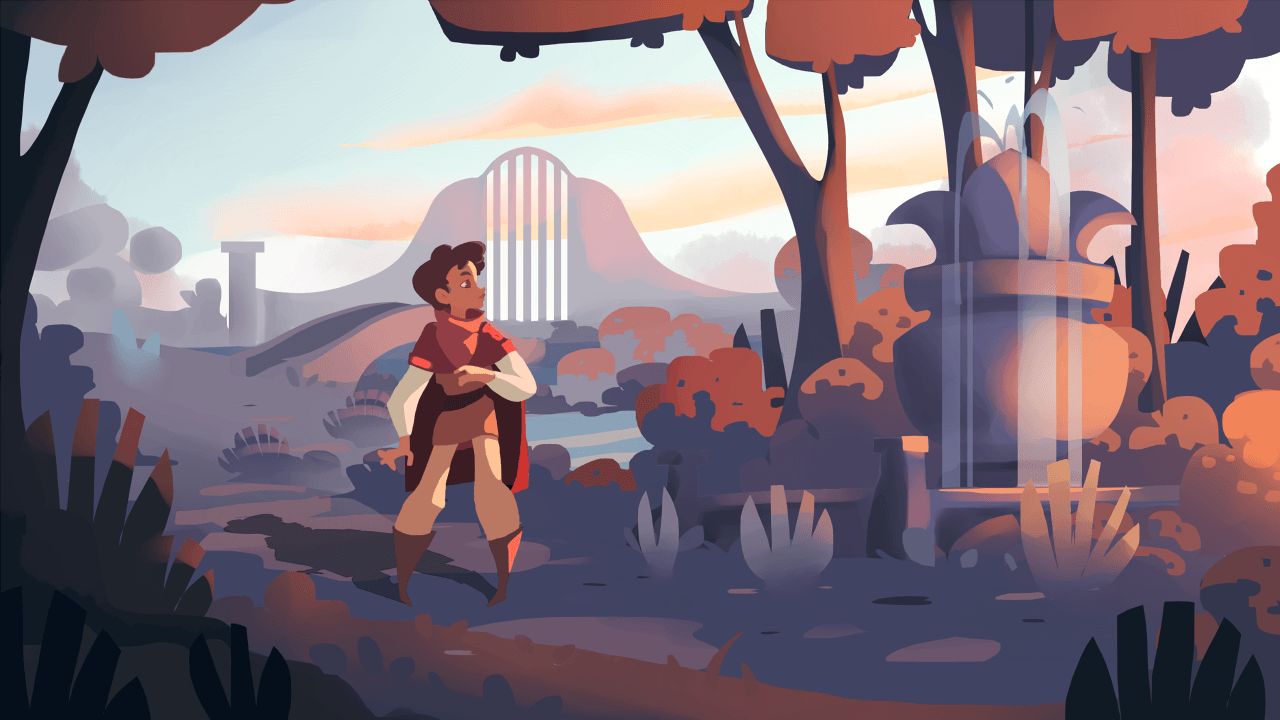
Illustration by Apolline Etienne from Michael J. Evans’s THE ADVENTURES OF FLORIAN
January 9, 2020
Well, I didn’t get that palmier or macaron: the flight was delayed, and I had to rush to get the connection in Paris, then got overcharged on the cab fare on my way to the train station. Of course, I knew this when he told me the price, but I was so tired I let it go because it was not worth the energy I would have to expend. Besides, the universe has a way of balancing these things out, and he was pointing out tourist attractions. Then, I had to rush to the next train once I got to Prague, or wait, and I lost my hat somewhere between going through all the security checkpoints.
I’m here though, a taxi driver was waiting for me at the train station. Thanks to the PARMA team, I didn’t have to worry about having to arrange a ride.
Waiting in the airport at Dulles to get to Paris was fantastic. I ended up engaged in a great conversation with a guy from Israel who creates video games. We had an interesting conversation about music, and the challenges of scoring for games. I had a great meal in the hotel, and enjoyed chatting with the people working here. Now however, I am going to crash. I’m exhausted and want to be fresh in the morning to meet the orchestra.
I remember reading the fairytales and the stories where the person “set off into the world to find their fortune,” at least that is the line I remember. Fairytales are important. I know they were for my friends and me, we were the oddballs, the freaks
January 10, 2020
I’m getting ready for the session. The hotel is really nice and I enjoy my room. The people at the hotel are friendly and seem willing to assist. I’m reviewing the score now and what I want to say to the orchestra. I am ready. Let’s see what happens.
Well, I had the first session and it was fantastic! When I walked in, there were prints of some of the images from the piece lining the walkway to the place where the orchestra plays. They play, and we record in this historically protected old communist era building.
The Janaček Philharmonic is a wonderful orchestra. We got through part of Act 1 as well as one scene from Act 2, because it was short, easy, and we had 15 minutes, and we could capture it in time. The next scene in the order in which the piece was written is very long and complex, so we would need a lot more time with it.
Session Suggestion:If you are a composer who is going to attend a recording session, you should know that this happens. There is a recording schedule, and many times you do not record the piece in order; in fact, you rarely do. We are recording this piece in order, for the most part, because it makes sense to do so, but depending on the orchestration, you may not. For example, why have a trombone player who only plays at the end of a piece or in just a few places sit around for days doing nothing, when you can just record those sections in one session and then record the rest? You are going to do many “takes” of each section and the sound engineer is going to have to piece it all together anyway.
Another thing to prepare for, and it may scare you the first time you experience it, is the fact that for recording as opposed to a concert performance, the players will generally have not rehearsed together, and may not even have played the part before, particularly if it is easy enough to sight read. Remember, you are dealing with highly trained professionals: they will be able to pull it together quickly and you will be amazed.
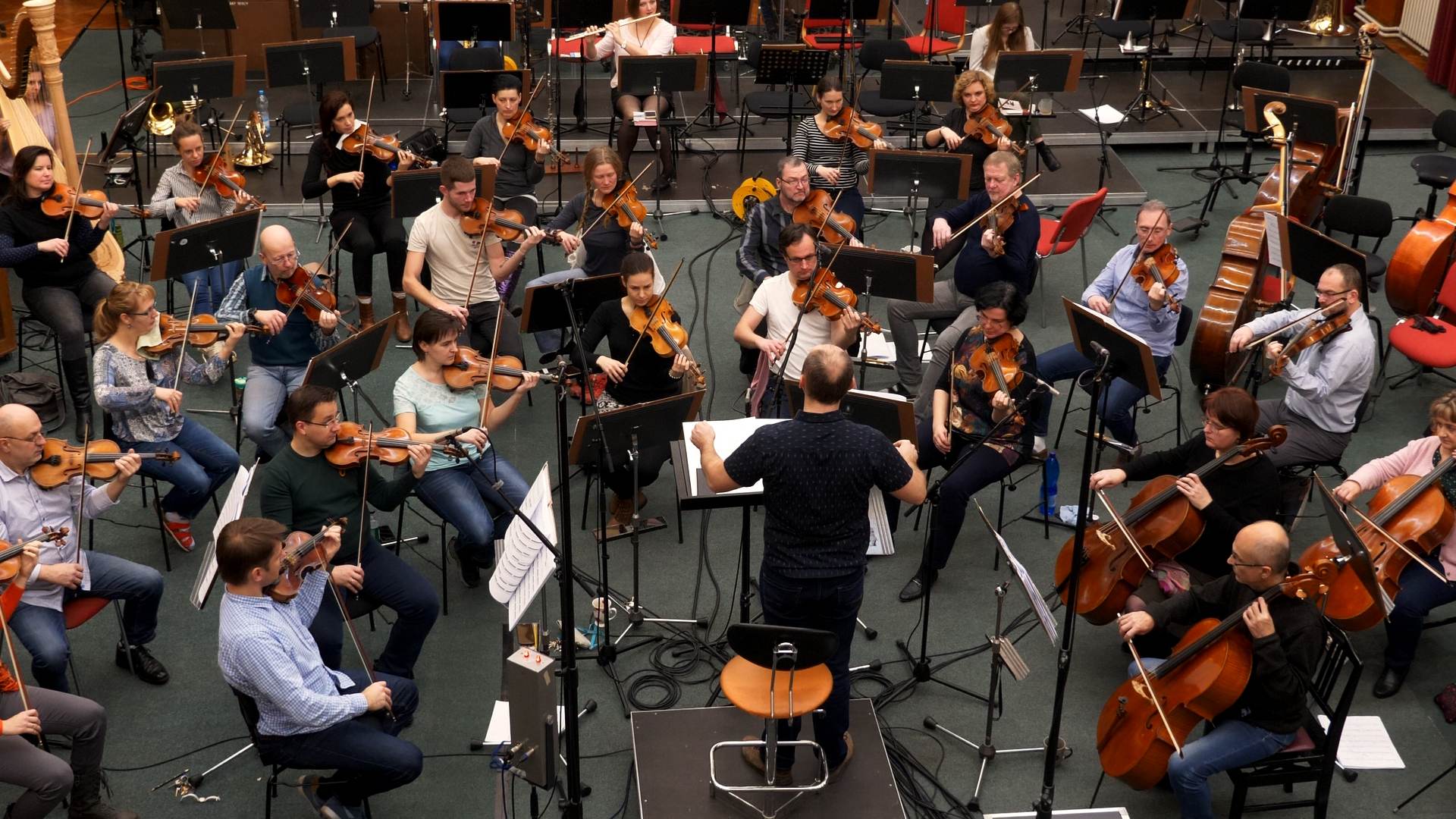
Something I learned today was to be very careful with string players switching quickly from arco to pizzicato. I had a string player look at my piece, and she was able to play it, but she is a chamber player and a soloist. She did the pizz. with the left hand. In orchestral playing this is nearly impossible and is rarely done. So, if asking a player to review your part; be sure to tell them to view it through the eyes of an orchestral player, not a soloist.
This information is going to be very helpful and will cause me to edit the current piece I’m writing now. Of course, if you need the effect of rapid arco and pizz. changes, you may want to write it as a divisi, where some of the players will play the arco notes, and another group play the pizz. notes.
January 12, 2020
I had time to explore Ostrava yesterday, and will again today. It is a charming city, particularly at night. I love the way the light looks on the old buildings. This morning I woke at dawn to look at the old church outside my window. As the sun rose, the moon was still big in the sky and a flock of ravens flew over the moon and all around.
Session Suggestion:I’m not going to bore you with the details of my exploration. I only want to tell you that when you travel to a city to record, please get out and see the city you are recording in. And, don’t do the just tour groups or touristy sites. Go out. Get lost on purpose! Just get a phone plan with international data roaming and let Google maps get you back to the hotel. You will grow and find inspiration for years to come. It will change you, even if you are not aware of it. The ancients considered travel to be a form of higher education, which is why, if you follow astrology, travel and higher education are governed by the same house. So, get out there and explore. Consider it research for composition and allow it to change you. I promise you will not come back as the same person you were before you left, and that will be a good thing.
The players seem to be enjoying the music as well, which makes me really happy.
January 13, 2020
I’m in the hotel getting ready for the day’s recording session. If you are an avid traveler and coffee drinker, like myself, you may already know this, but, if not:
Session Suggestion:It is worth going to a grocery and picking up a small jar of instant coffee to keep in your room if you have a way to make boiling/hot water. It will definitely help get your caffeine levels up. I drink a lot of coffee and it is just not practical to sit in a shop and drink coffee in the morning. I will still go in the afternoon and have a delicious pastry as well, but for morning and for times when I’m working, it comes in handy.
The recording session went well today. We got a lot done. Some of the things that I had anticipated being difficult were not. The players really knocked it out of the park. It was amazing! I also picked up additional tips for future recording sessions. These may be of help to you:
When creating the score, I know that many times we leave things out, like pedal markings for the piano, or any ad lib section, etc. Obviously when recording for solo instrument or chamber ensemble, this is not a problem. and we do it to have a less cluttered document. For orchestra writing, it may be helpful to create 2 scores: one for recording and one for concert performance.
The recording score would include pedal markings, etc. The reason for this is so that when doing multiple takes, it is easier for the editor to connect all of the takes. If, for example, a player uses damper pedal one way in one take, and a slightly different pedaling in another, it makes it difficult to splice 2 takes together, since there is no consistency. You will be able to hear this in a recording.
Many of you probably already create a score like this for playback if you are using notation software, since you would have to incorporate pedal marking etc. in the score to generate a sound file that would play back properly. I know I do, but then delete these in order to make the score less cluttered. Now I know that it is of help to the conductor, I will leave them in for the recording score and delete them for the proper concert score.
Session Suggestion:Another quick tip: if you have special effects written into the score, prepare to discuss them and work to get it to sound the way you want. You may want to include as much information in notes ahead of time. For example, I included a part for Double Bass that was in the treble clef and really high. It had to be done with artificial harmonics: the individual players were concerned that it would not be in tune. I had to explain that this was the effect that I wanted. It was meant to sound slightly out of tune. If I were not there, it is possible that, in an attempt to be perfect, the section in question may have been performed as a solo, taken down an octave, or performed on a cello or viola. If this had happened, the effect that I was hoping to achieve would have been lost. So, if you are asking for something unusual, even if you notate it, you may want to include an explanation to avoid any waste of time.
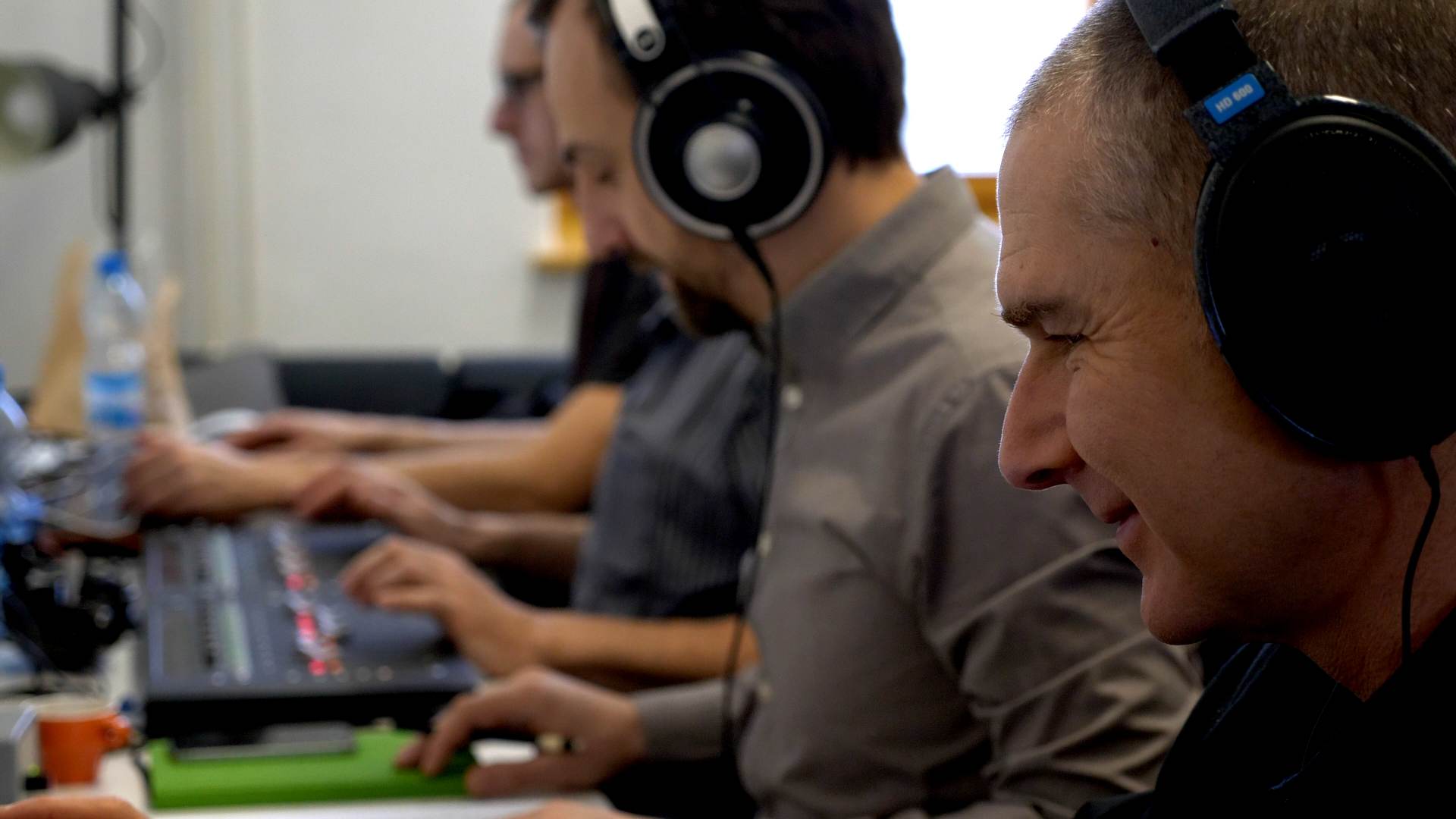
Michael in the control room, with PARMA Recording Sessions Manager Jan Košulič
January 14, 2020
Today’s recording session was a long one from 9:00 to 16:00 but we got a lot accomplished. There were things that came quickly and others that took some time. If you have never recorded before, it may surprise you to know that some of the sections that are the most difficult to record are the slow sections that are in octaves or unison, simply because the intonation with more than one player is virtually impossible to get absolutely perfect.
We all strive for perfection, but the ever so slight variations in tone and pitch are what give a human quality to performances. If you are looking for absolute perfection, then a computer will provide that, but the music will not feel alive. Just be aware that our search for perfection takes time and is ultimately unachievable: consider it your “Persian flaw.” The producer knows this and has a schedule, so it is nothing for you to worry about, just understand that it is something you will experience.
I got the options for the cover design as well. They were both stunning. You may also know that you may be multitasking like this and be prepared to think about it.
Session Suggestion:The best tip I can give you is: get plenty of rest. You are going to need to think a lot and it can be tiring. Your input is vital, and you need to be present.
January 15, 2020
We had another great session today. Tomorrow is going to be a long one, but we are definitely on schedule. Now we are in a really fun section of the work with lots of orchestral colors and textures. The players seem to be enjoying the music as well, which makes me really happy.
We have 2 more days of recording, and I want to pass on a couple more tips that should make your session go much smoother. The first tip is extremely important, particularly if you are recording a larger work. (This piece is for full orchestra, with some additional percussion, illustrations, and it is over 90 minutes long.)
Session Suggestion:Bring a laptop with the notation software you used, along with the files for all of the parts and scores for the work you are recording. Particularly in larger works, there are just so many notes, staves, and parts that you are inevitably going to miss something. It is just a fact. If that happens, you will then have the ability to get updated parts or scores to the conductor and players in a matter of minutes. Additionally; while you are recording, you may find that you want to make changes. It is easier to do it that day while it is still fresh in your mind, rather than wait.
I mentioned parts: it is important to have well engraved or copied parts. This is even more important than the score, since the players are going to be working with these. Also, if you put something in performance note, don’t expect the players to necessarily read them. They probably won’t. They will look at the part and then have questions. If you have something that is non-traditional in the score and it is explained in the notes, whenever possible, try to include the explanation in the parts as well, even if you have to put an asterisk or number beside the place where it occurs and then, put the explanation in the footer of the part. Trust me, it will eliminate a lot of questions and make the session go much smoother.
January 17, 2020
Well, after a week of recording, we finally wrapped up today. We recorded the ending of the final scene in the story. Florian and Florizel are transported back to the old witch’s castle by the Black Knight, and wedding preparations are underway. After some events, the two are married and people gradually leave. The Black Knight, Florian, and Florizel travel together for a bit, then the newly married couple go off together to live happily ever after.
This was mirrored in the recording process, since orchestra players were dismissed after they had nothing else to play. I felt like I had written a version of Haydn’s “Farewell” symphony.
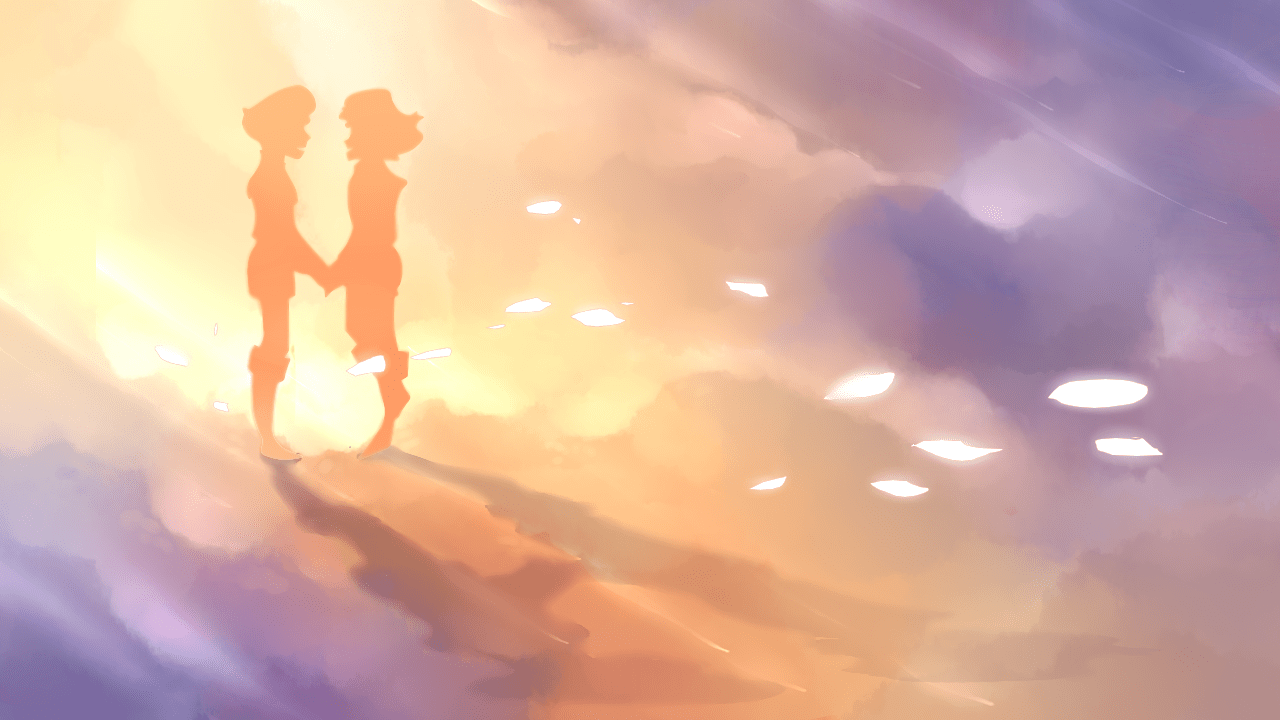
Illustration by Apolline Etienne from Michael J. Evans’s THE ADVENTURES OF FLORIAN
So, it appears I have come full circle. It isn’t really a circle though; it is an ascending spiral. With each passing of that beginning point, I am further long than I started. I know more. I have grown more. I suspect you will feel this too.
Session Suggestion:So, one of my final tips for you is: expect this feeling of, for lack of a better word, sadness. It is natural and beautiful. You will have spent so much time with the other talented, creative people you worked with on your project, that is it only natural to miss them when the session ends. But, there is joy too. It’s like saying goodbye after visiting friends. And, there is still so much work ahead till the project is ready for release.
You are going to have to review the first round of edits, which will be like reviewing the photos of a wonderful vacation. When I am reviewing the first round of edits, I always find myself craving the food and drinks that I had at the time we recorded. Then, there are the approvals of the artwork, and promotional materials to prepare. You will still have a lot to do. This is not the end of the project. It is just the beginning. After it is released, you will have to do interviews and other stuff. So, enjoy the process.
I hope this journal of my experiences will help and prepare you for your recording session. It has been my great pleasure to share this experience with you. You are in wonderful hands with the PARMA team. I have never met a more wonderful group of professionals, and I’m sure you will feel the same. Goodbye for now, or as they say here in the Czech Republic, Na shledanou!
